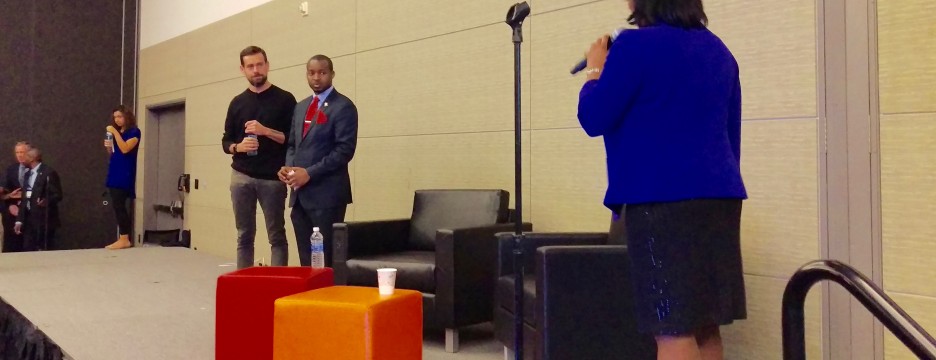
28 Mar Twitter’s CEO on Not Just Hiring Friends & Committing to Diversity in Tech
Jack Dorsey, CEO of Twitter and Square, was in Boston Friday to talk about his upbringing, how he manages leading two companies and, most importantly, what the companies are doing to better support diversity in the workplace.
Dorsey was in Boston as a guest speaker for the National Society of Black Engineers 42nd Annual Convention, which was expected to bring in more than 10,000 attendees at the Boston Convention & Exhibition Center.
While Twitter is making an effort to improve its diversity in the workforce, it still has a ways to go toward better reflecting underrepresented minorities who have a significant presence on the platform. In the company’s 2014 diversity report, it said only 2 percent of its employees were black and only 3 percent were Latino.
Here are some highlights from what Dorsey said on Friday:
The only way we’re going to be creative is if we have perspective from all over.
Diversity is integral to Twitter’s and Square’s futures: Dorsey said they won’t be creative or relevant unless they have a “diverse point of view that is actually representative of who uses the service.”
“The only way we’re going to be creative is if we have perspective from all over,” he said. “The only way we’re going to serve our customers in the right way, no matter where they are, is we have empathy for them and the best way to have empathy for them is to have folks who are more representative of them as well.”
Twitter ‘s diversity hiring goals for this year includes increasing the number of underrepresented minorities from 10 percent to 11 percent overall in the U.S, and from 7 percent to 9 percent in tech positions. It also plans to boost the number of underrepresented minorities in leadership roles to 6 percent.
Empathy is not just about listening, but understanding and action: In talking about the importance of empathy, Dorsey recalled when he went to Ferguson, Miss., in 2014 to join the protest against police brutality following the fatal shooting of Michael Brown. He said he had been amazed at the activism that has emerged on Twitter over the years “because it was showing a world in which I never really saw at the human level.” That changed when he went back to his home state.
“It was important to feel what was happening and it was important to me to understand the role of our technology and how it could be better in that,” Dorsey said.
Twitter’s and Square’s lack of diversity began with hiring friends: Dorsey said one thing that leads to a lack of diversity in companies is when they start out by hiring friends, friends of friends and then when they go into growth mode, they don’t pay attention to the makeup of their growing workforce.
“At some point you just realize, ‘wait a minute, we’re only getting people that we know instead of people that are going to add a new dimension to our work,'” he said.
Companies need to look beyond top schools for talent: Dorsey said another mistake companies make that can lead to less diversity in the workforce is focusing on recruiting talent from only top-notch schools. He added that while some companies have moved on from this practice, many haven’t.
“We need to recognize these are ideas that may have worked for a particular thing at a particular point of time, but it’s not relevant anymore and it’s not something we want to build either,” he said.
Commitment to diversity is something that needs to be constantly worked on: Dorsey said focusing on inclusion is not about just “an alignment of purpose, but a constant redefinition and recommitment to the purpose.” He said it’s something his companies “have a whole lot more work to do.”
“From my role and my perspective it’s saying it all the time, it’s learning what’s working and what’s not working, and it’s mandating it across the company,” Dorsey said.
One example of how this has physically manifested at Twitter and Square: Dorsey said both companies started doing unconscious bias training with all employees and interns earlier this year.
Find questions that aren’t being asked: Dorsey said one important thing he does with both companies every week is addressing questions they aren’t talking about.
“You always get something really, really interesting as a discussion point that makes us think a little bit differently, but also potentially has some action around it,” he said.


Sorry, the comment form is closed at this time.